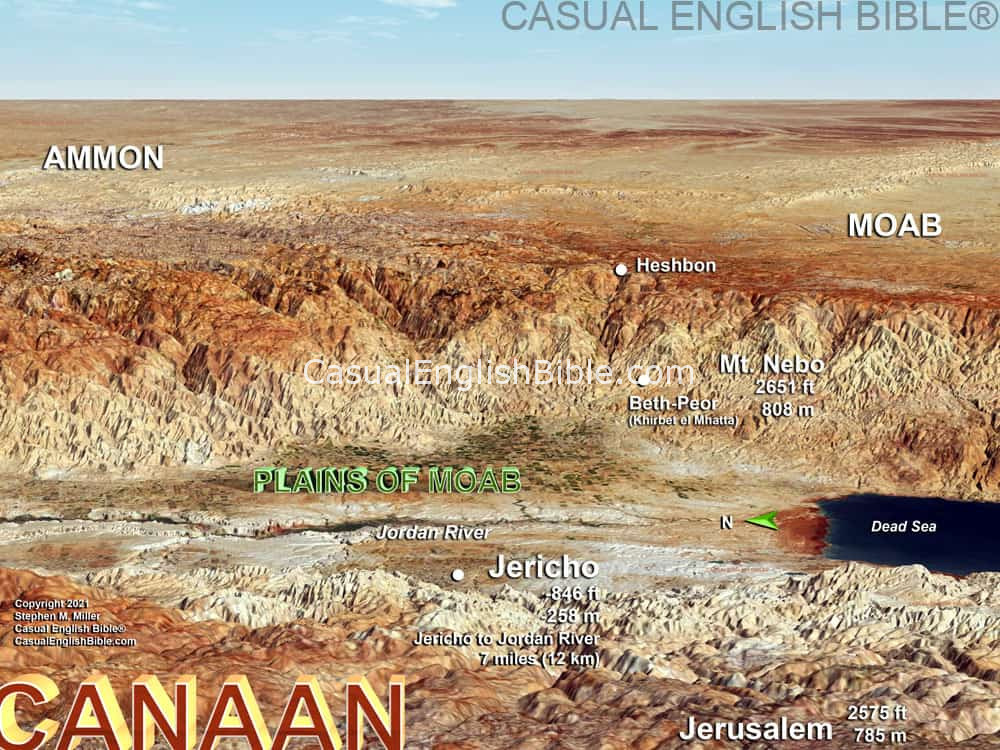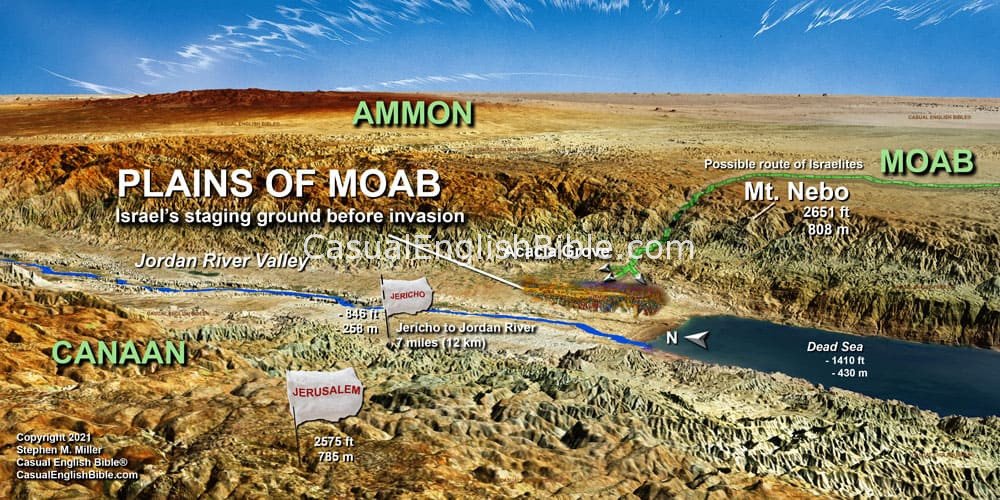Deuteronomy 31
Moses ties up loose ends
Moses announces his retirement
1Moses went out to speak with the people of Israel: 2“I am 120 years old. I can’t lead you anymore. Also, the LORD told me, “Don’t cross the Jordan River.” 3The LORD your God is going to cross the river ahead of you and destroy the nations there. You’re going to take their lands. When it’s time for you to cross, Joshua will lead, as the LORD said earlier. 4You know what the LORD did to the Amorite kings Sihon and Og, along with their people. He’s going to do that to the nations across the river. 5The LORD is going to deliver these people into your custody. When he does, you need to do what the law says. [1] 6Stay strong and brave. There’s nothing to fear over there. The LORD your God is going with you. He’s not going to leave you.”Joshua gets the job
7Moses then called out to Joshua, with everyone watching. Moses told him, “Stay strong and brave. You’re going with these people to the land that the LORD promised their ancestors he’d give them. 8The LORD is going with you. He’s taking point, ahead of everyone else. He’s not going to run off and leave you. Don’t be afraid. You have nothing to worry about.” 9So Moses wrote down all the laws he taught the people. Then he gave it to the priests, Levites entrusted with carrying the sacred Box of Law, [2] and to the elders of Israel.10Moses told the people, “There’s something you need to do at the end of every seven years. That’s when you free all the Israelite slaves [3] you own. Do it during the Festival of Temporary Shelters. [4] 11When everyone gets together at the worship center, wherever the LORD your God decides to put it, read this law out loud so everyone can hear it. [5] 12Get everyone together, men, women, and children. Include immigrants and foreigners with you at the time. Let them hear the laws and learn to respect the LORD your God. Don’t just listen to these laws. Follow them. 13These laws will be new to the children. It will give them a chance to hear the laws and to learn to respect the LORD your God. You need to hang on to that respect for as long as you live on this land you’re about to take on the other side of the Jordan.”
God: “These people will leave me”
14The LORD told Moses, “Look, it’s almost time for you to die. The day is almost here. Tell Joshua to come to the tent worship center. I’m going to tell him what he needs to do.” Moses and Joshua went to the tent worship center together. 15The LORD appeared in the tent, within a column of smoke or cloud [6] that stood at the entrance to the tent. 16The LORD said to Moses, “Look, it’s about time for you to rest [7] with your ancestors. After you go, there’s coming a day when these people will leave me. They’ll start worshiping gods of other nations in the area. They’re going to break the contract they made with me. 17I’ll get angry with them, and then I’ll give them the distance they want. I won’t be there for them anymore. They’ll welcome evil and get into deep trouble. Then they’ll say, “We’ve gotten into this trouble because God isn’t here anymore.” 18Well, they’re not going to get anything from me but distance. They’re covered in evil, and they left me for other gods.Moses assigned to write a song
19I want you to write down this song I’ll give you. Teach it to the people of Israel so they can sing it and think of me. 20I’m going to take them into this land where milk and honey flow like rivers. I promised their ancestors I would. The people will do well for themselves in this land. They’ll have all the food they want. But they’ll leave me for other gods. They’ll reject me and break their agreement with me. 21When this happens, when sin gets them into deep trouble, they’ll remember this song. They won’t forget how to sing it. Neither will their descendants. I know these people gravitate toward evil. It’s a pattern they’ve been developing.” 22Moses wrote the song [8] that same day. He taught it to the people of Israel.Joshua’s marching orders
23Moses used God’s words to commission Joshua, son of Nun: “Stay strong and brave. You’re going to take the people of Israel into the land I promised to give them. I’ll be with you.” 24Moses finished writing the Law Book. [9] 25He took the Law Book to the Levite priests entrusted with carrying the Box of the Law.26Moses told them, “Take this Law Book and keep it beside the Box of the Law that belongs to the LORD. It will serve as a reminder and a warning. 27I know how stubborn and defiant you are when it comes to the LORD. I have eyes. I’ve seen it. How much worse will you get when I’m dead? 28Call a meeting of the tribal leaders and the appointed officials. I need to talk to them, and I need heaven and earth to witness it. 29I know that after I die, you’ll do terrible things and get the LORD angry. You’ll do exactly what I’ve told you not to do. And you’ll get yourself into more trouble than you can handle.” 30Then, with all the people of Israel listening, Moses recited [10] the song.
Footnotes
The law says to kill them all. “When the LORD your God gives them to you, you’ll need to finish them off. After you defeat them in battle, wipe them out by killing them all. Don’t make any peace treaty with them. Don’t show them mercy” (Deuteronomy 7:2). Also: “They promised the LORD, ‘If you will let us defeat those people, we will annihilate all Canaanites and decimate their cities.” (Numbers 21:2). The Hebrew word for “annihilate” is herem. Scholars describe it as a “curse of war” or a “ban.” The “ban” means that when soldiers conquer a city, for example, they are banned from keeping anything for themselves—everything in the city is under the curse of war and must die. Joshua later fought by those rules. His orders at the Battle of Jericho: “Keep yourselves from the things devoted to destruction, lest when you have devoted them you take any of the devoted things and make the camp of Israel a thing for destruction and bring trouble upon it” (Joshua 6:18 English Standard Version).
Better known as the Ark of the Covenant, a sacred chest that held the Ten Commandments. It was Israel’s most revered object, and it was kept in the most sacred room inside the worship center, a room sometimes known as the Holy of Holies or the Most Holy Place. For a description, see Exodus 23.
Some Israelites would offer to work as slaves because they couldn’t afford to take care of themselves. Others were ordered into slavery to pay off debts they owed.
It’s often called the Festival of Shelters or Festival of Booths. In Exodus, it was the last harvest festival of the year. That’s when farmers harvested late-season crops such as grapes, figs, and olives (Exodus 23:16). This was in the late summer and early autumn. The Hebrew word describing the festival here is sukka. It can mean tent, canopy, or temporary shelter. Moses said God wanted the Israelites to observe this festival by building temporary shelters and living in them for seven days “so you and your descendants will remember that the people of Israel I led out of Egyptian slavery once lived in shelters like this” (Leviticus 23:43).
Somewhere along the way, the people forgot about this. The Law Book may have been the long-lost book of Jewish laws that was discovered at the temple during the reign of King Josiah (ruled about 640-609 BC). When he heard the laws read, he ripped his clothes because he realized the nation was breaking a lot of laws. He launched a revival and destroyed idols and shrines in his kingdom, the southern Jewish nation of Judah (2 Kings 22:8). The revival was apparently too little, too late. Babylonian invaders from what is now Iraq leveled Jerusalem and erased the Jewish nation from the political map during that same generation, in 586 BC.
The Hebrew word, anan, can mean: cloud, smoke, or “mist.”
In this context, the Hebrew word sakab means Moses is about to die. The word could mean: lie down, sleep, leave, go to bed.
Deuteronomy 32:1-43 is known as the Song of Moses.
“Law Book” probably refers to the laws Moses delivered in his speeches preserved in Deuteronomy, many scholars say. He reportedly wrote what is now Deuteronomy chapters 1-30 and gave them to the priests for safe keeping (31:9.
The original Hebrew word is dabar. It can mean: sing, recite, say, speak. It’s anyone’s guess which one Moses did.
Discussion Questions
- Sorry, there are currently no questions for this chapter.








